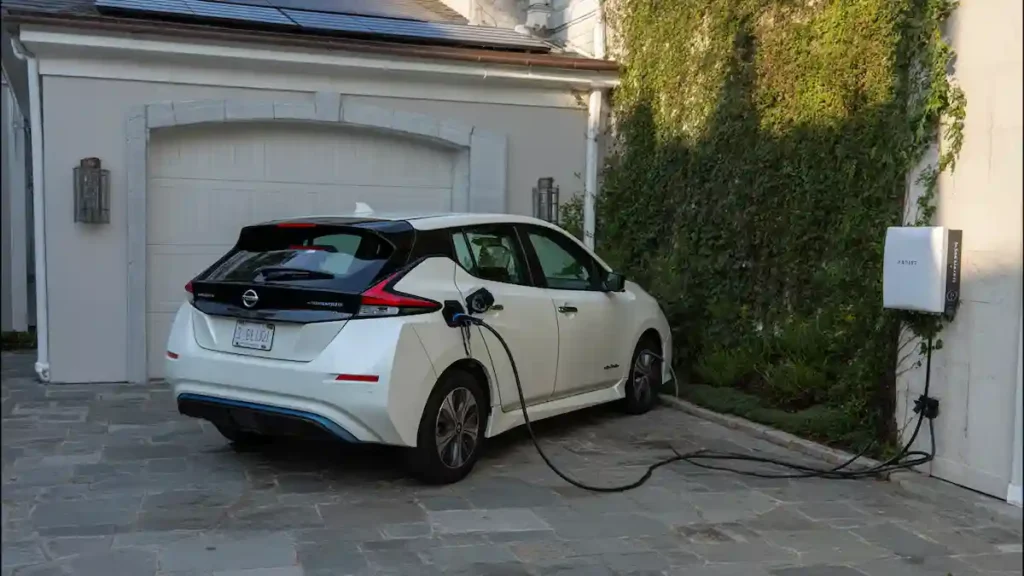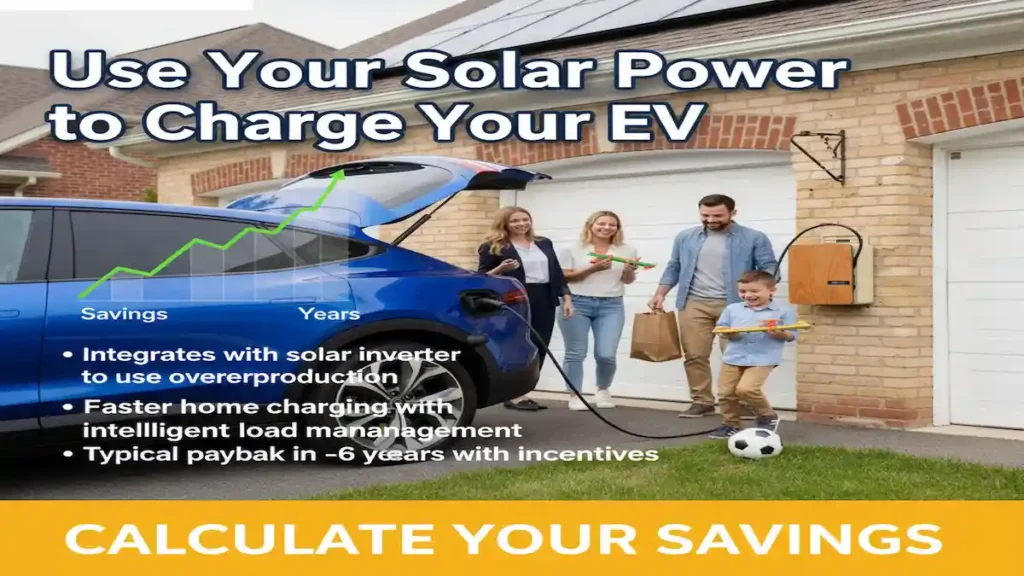Washington, D.C. has always been ahead of the curve when it comes to clean energy and climate responsibility. And in 2025, the city’s residents are finding new ways to save money and reduce emissions — one of the smartest being the shift to solar EV chargers.
If you’re a homeowner or EV driver in D.C. (or nearby in Maryland or Virginia), this guide is for you. We’ll explain exactly how solar EV charging works, how much it costs in the DMV area, what local incentives are available, and which systems work best for homes in the region.
What Is a Solar EV Charger — and Why Are D.C. Drivers Using Them?
A solar EV charger is a home charging setup powered by energy from rooftop solar panels. If you’re wondering whether solar panels alone can fully power your EV at home, check out our detailed guide on the topic: Is the Sun Enough? What It Takes to Charge an EV with Solar Panels. It allows you to charge your electric car using sunlight instead of utility electricity, which is especially valuable in areas like Washington, D.C. where utility rates are among the highest on the East Coast.
With DC’s clean energy push, local solar incentives, and the growing number of EV owners in the region, installing a solar-powered charging. Interested in how clean energy like solar actually holds up for EV charging? Don’t miss our expert breakdown in Clean Energy Charging: Can It Reliably Power Your EV?. station makes both environmental and financial sense.
Recommended Posts
Top 7 U.S. States Offering Massive EV and Solar Incentives in 2025
BYD vs Tesla Showdown: Range, Charging, Price, Battery & More Compared
How Much Does It Cost to Install a Solar EV Charger in Washington, D.C.?

Image Credit: Photo courtesy of Solar Me
In the District, the full cost of installing a solar EV charging system typically ranges from $10,000 to $18,000, depending on whether you include battery storage. But here’s the good news — D.C. offers some of the best solar incentives in the country:
Local Incentives:
30% Federal Solar Tax Credit (ITC) applies to solar panels, battery storage, and EV chargers
D.C. Solar Renewable Energy Credits (SRECs) let you earn money by producing solar electricity — currently valued around $380 per credit
Maryland and Virginia offer state-level grants, tax exemptions, and utility rebates for residential EV charger installations
Net metering is available in D.C., MD, and VA — which means you get credited for excess energy your panels send to the grid
After all credits and incentives, many D.C. homeowners pay as little as $6,000–$10,000 out of pocket for a full solar + EV charging setup.
Best Solar EV Chargers for D.C., Maryland & Virginia Homes in 2025
Looking for the right solar EV charging system for your home in Washington, D.C., Maryland, or Virginia? Here are the top-rated systems DMV homeowners are turning to for clean, affordable driving — from smart urban solutions to portable off-grid options.
1. Zendure SolarFlow + ProDock EV Bundle
Why it fits the DMV:
This setup is perfect for D.C. rowhouses and compact rooftops. Zendure’s ProDock allows wall-mounted EV charging while the SolarFlow battery intelligently stores solar power for use anytime.
Pros:
Prioritizes solar energy over grid power automatically
Real-time energy tracking with Zendure App
Modular design — expand your storage anytime
Cons:
Higher upfront cost (battery included)
Needs professional installation for city code compliance
2. SolarEdge Home EV Charger
Why it fits the DMV:
Popular in Maryland and Virginia suburbs, this charger is ideal if you already have a SolarEdge solar inverter. It diverts solar overproduction to your EV — making great use of peak sunlight hours.
Pros:
Seamless integration with SolarEdge solar systems
App-based monitoring and charging schedule
Sleek design — perfect for garages or carports
Cons:
Only works with SolarEdge setups
No built-in battery or backup capability
3. Tesla Wall Connector + Solar Panel System
Why it fits the DMV:
With so many Tesla drivers in D.C. and Northern Virginia, this charger is a popular choice. Tesla offers local installation and integration with Powerwall batteries for full energy independence.
Pros:
Super-fast EV charging for Tesla models
Optional Powerwall backup for outages
Clean, modern look
Cons:
Best for Tesla vehicles (non-Tesla adapters needed)
Limited support for third-party solar hardware
4. Bluetti AC200MAX + EV Relay + PV Panel Array
Why it fits the DMV:
Bluetti’s portable solar generator system is great for homeowners without rooftop access — like renters or those with shade-heavy properties. With an EV relay box, it becomes a mobile solar EV solution.
Pros:
Off-grid capable — works anywhere with sun
Expandable battery capacity
Charges from solar, wall, or generator
Cons:
Not a hardwired home EV charger
Slower charging compared to wired options
5. EcoFlow Power Kit + EV Plug Adapter
Why it fits the DMV:
EcoFlow’s modular kits are becoming popular with vanlifers, tiny homes, and backup-focused users. With smart controls and an EV adapter, it’s perfect for flexible charging needs.
Pros:
All-in-one solar + battery + EV-ready setup
App control + live performance data
Can be mounted permanently or used as portable backup
Cons:
Needs adapter for full EV charging compatibility
May not meet D.C. hardwiring regulations without upgrades
6. Eco-Worthy 2KW Off-Grid Solar EV Kit
Why it fits the DMV:
If you’re off the main grid (rural MD or VA), Eco-Worthy offers an affordable way to power your EV using pure solar. Ideal for backup or second-property charging.
Pros:
Complete solar kit with panels + controller + inverter
Lower cost than grid-tied systems
Can power small home loads in addition to EV charging
Cons:
Requires manual wiring and technical setup
Limited charging speed without battery add-on
Is Solar EV Charging Worth It in Washington, D.C.?
Yes — and especially in D.C. Here’s why:
D.C. electricity rates are among the highest in the region (avg. $0.15–$0.18/kWh), so solar energy means real savings
The city’s SREC program can pay homeowners $500–$1,000+ per year just for generating solar electricity
Combine that with free EV fuel and available tax credits, and most systems pay for themselves in 4–6 years
Homeowners in Maryland and Virginia benefit too, especially with state-level rebates and newer net metering programs in areas like Montgomery County and Northern Virginia.
What Are the Downsides?
While solar EV charging is appealing, it’s not a perfect solution for everyone.
Upfront Cost: Even with credits, the initial investment is significant. Homeowners need to be ready to spend $6,000 or more.
Roof Conditions: Not every home in D.C. has an ideal roof for solar. Rowhomes with shading or flat layouts may have limitations.
Nighttime Charging: Without a battery, you’ll still draw power from the grid at night. Battery storage adds cost, but gives you true energy independence.
Permit Delays: D.C. permits and interconnection processes can take 6–12 weeks depending on demand and local utility coordination.
Reviews from Washington D.C. Users Who Installed Solar Chargers
“I installed Zendure’s solar system with EV charging in Northeast DC and I haven’t paid a power bill in 6 months — or a gas bill in a year. Charging is basically free now.”
— Malik R., Washington, D.C.
“Maryland’s tax credit and utility rebate cut our install cost in half. We charge our Mach-E on sunshine, and sell back the rest to BGE.”— Jenna L., Silver Spring, MD
“The Tesla charger works beautifully with the solar panels I already had installed in Arlington. I didn’t expect it to charge this fast.”
— Derek P., Arlington, VA
FAQs – Solar EV Chargers in Washington, D.C.
Can I install a solar EV charger in a D.C. rowhouse or townhouse?
Yes, as long as your roof receives decent sun exposure. Many D.C. homes use microinverters to work around shading issues.
Does Pepco allow net metering for solar EV systems?
Yes — Pepco supports net metering for residential solar installations in D.C., and you can earn credit for unused electricity sent to the grid.
Do I need a solar battery to charge at night?
No, but without one, your system will draw from the grid after dark. Adding battery storage (like a Zendure or Tesla Powerwall) makes your EV charging completely solar-powered 24/7.
Are there rebates for EV chargers in Maryland or Virginia?
Yes. Maryland offers a rebate of up to $700 through the MEA for Level 2 chargers. Virginia utilities like Dominion Energy offer charger rebates and time-of-use billing plans.
Author
Oscar Mark writes on solar energy with one objective-make clean power understandable and accessible to all. At Top Solar Picks, he covers everything from reviews of solar panels to energy bill cutting tips. With his background in environmental science and years of research on clean technology, Oscar combines knowledge with curiosity in his writing.
All of...

